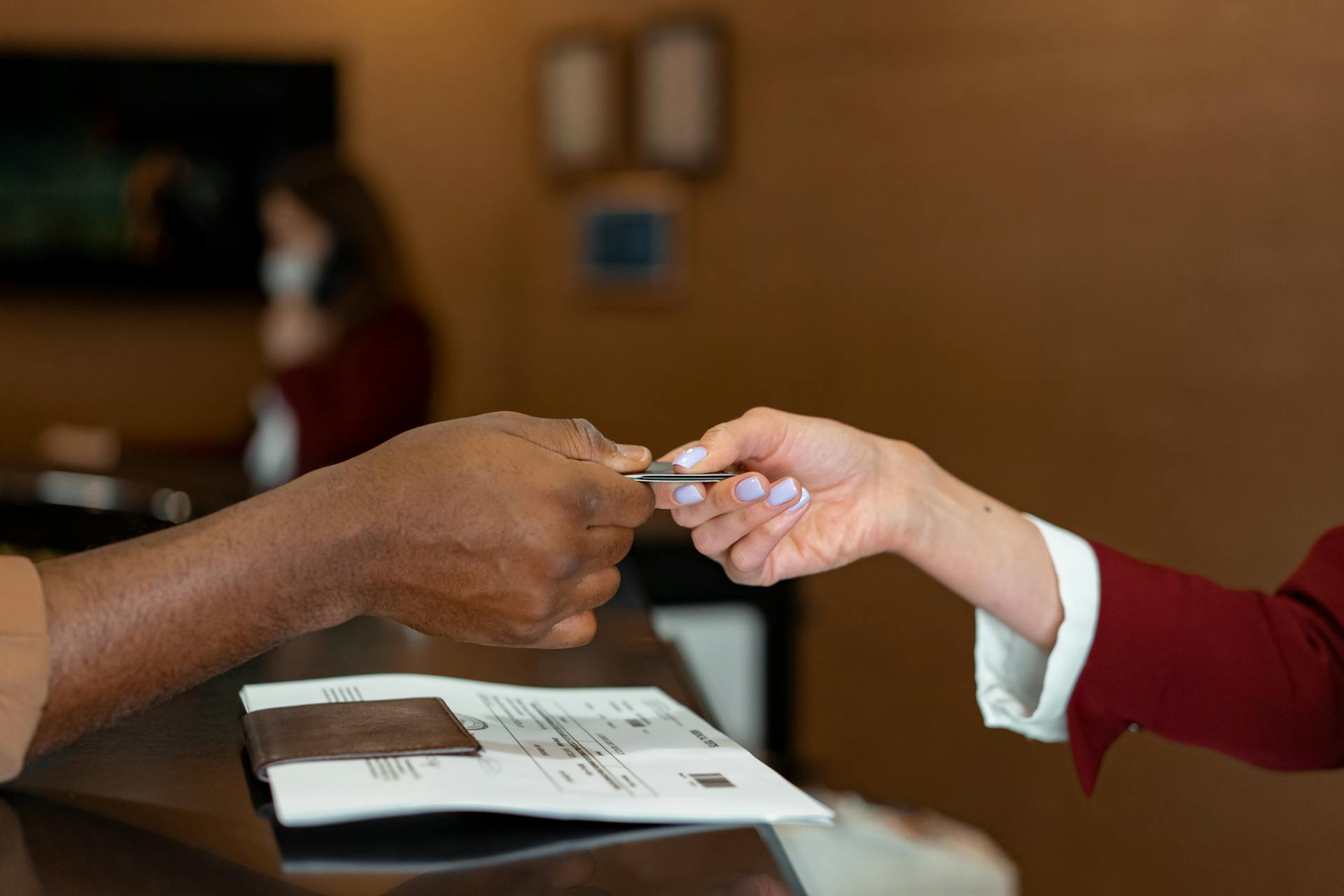
Credit card preauthorization for hotels is a common practice that can either save you money or leave you with a surprise bill.
Hotels often use a preauthorization hold to ensure you have sufficient funds in your account to cover any charges.
This hold, which can range from $50 to $200, is typically placed on your credit card when you arrive at the hotel.
You won't be charged the full amount, but rather, the hold will be released once you check out.
If this caught your attention, see: How Long Can a Bank Hold a Government Check
What is Credit Card Preauthorization?
A credit card preauthorization is a temporary hold of a specific monetary amount made on a guest's credit card when they reserve a room. This hold varies from hotel to hotel.
The amount of the hold can be one night's stay or the entire stay, depending on the hotel's policy. Some hoteliers pre-authorize one night's stay, while others pre-authorize the entire stay.
A preauthorization is not a charge, but rather a temporary freeze of money to validate the credit card and reduce fraud. It's a way for hotels to guarantee payment during busy times.
Intriguing read: I M B Bank Share Price Today

If the guest doesn't have enough credit on the card, the preauthorization will alert the bank and cardholder, protecting both the guest and the hotel. This is especially important for online reservations, where the hotelier needs to verify the validity of the card data.
The pre-authorization amount is not transferred from the customer's account to the hotel, but only "frozen" to ensure its availability before the stay is confirmed. This temporary hold typically has time limits of a few days, usually 7-15 days before payment is due.
The preauthorization amount can be equal to the cost of the first night, the cancellation fee, or even a higher amount to cover any damages. Each hotelier can withhold a different amount at their own discretion.
Common Issues and Risks
Credit card pre-authorization is not a foolproof system, and hotels still face some common issues and risks.
One major risk is that customers might not show up, which can result in lost revenue for the hotel.
This can happen even if the credit card is valid, leaving the hotel with a vacant room and no payment.
Another risk is that the card used for pre-authorization is fake, which can lead to financial losses for the hotel.
Expand your knowledge: Pci Compliant Credit Card Authorization Form
Common Reasons for Non-Pre-Authorization by Hoteliers
Hoteliers often struggle with pre-authorizing credit card transactions, and it's not uncommon for them to avoid it altogether. Lack of time is a common reason why hoteliers don't pre-authorize.
Hoteliers may also lack the necessary permissions from their banks to perform pre-authorizations. This can be a significant barrier to implementing this practice.
Some hoteliers simply don't have the means, such as a point-of-sale (POS) system, to facilitate pre-authorizations. This lack of infrastructure can make it difficult to implement pre-authorizations.
Hoteliers may also opt to let online travel agencies (OTAs) handle pre-authorizations, which can be a costly proposition. This is because OTAs often undercut hotel rates to encourage bookings, which can lead to lost revenue.
Here are the common reasons why hoteliers don't pre-authorize:
- Lack of time
- Lack of will
- Lack of authorizations (by the ownership)
- Lack of permissions (by the banks)
- Lack of means (POS)
Challenges in OTA Authorization
Guests often misunderstand credit card pre-authorizations, thinking they're actual charges when in fact they're temporary holds to validate the card and reduce fraud.
The amount held varies from hotel to hotel, with some pre-authorizing one night's stay and others pre-authorizing the entire stay.
This temporary hold can alert the bank and cardholder if the card is stolen, protecting both the guest and the hotel.
Guests can still cancel their reservations until the cancellation window allows for it, unlike non-refundable rates.
Additional reading: How Long Can Credit Cards Stay on Your Credit Report
Avoiding Chargebacks and Fraud Risks
Handling credit card data requires caution to avoid chargebacks and fraud risks. Modern property management systems (PMS) can help with secure payment authorization.
You'd be right to consider the safety of credit card data, especially with old methods like jotting down details on paper or sending them via email with attachments, which are at risk of hacking.
Digitizing pre-authorizations reduces the risk of fraud and chargebacks. A modern PMS offers further fraud protection by allowing you to "tokenize" credit card data, converting it into a specific identification number that can't be used elsewhere.
Credit card pre-authorization is a secure process that relies on a double verification requiring the guest to enter a private code that proves they own the card. This not only protects the hotel from chargebacks but also reduces the risks of hacks and sloppy data handling.
With the new PSD2/SCA regulation, hotels can use a secure process that requires a double verification, making it harder for hackers to access sensitive data.
Curious to learn more? Check out: Why Do Banks Take so Long to Process Payments
Engine Incidentals Coverage

Engine Incidentals Coverage is a game-changer for businesses that want to simplify their hotel expenses.
As an Engine member, you can apply for direct billing and incidentals coverage, which provides one line of credit for every hotel reservation booked by your company.
This means you'll get one reconciled invoice at the end of the month, eliminating the need to worry about credit card authorization forms.
Using Direct Bill, you'll also be able to select Incidentals Coverage when making reservations, which charges incidentals to your account using a fraud-proof virtual credit card.
This way, you won't have to agonize over trying to match charges to individual reservations long after checkout.
Reconciliation is a breeze because the incidentals are tracked to individual reservations.
Worth a look: Saving Account Charges
Hotel and OTA Policies
Reservations at some hotels require a credit card number to guarantee, which may be pre-authorized to check the card's validity and temporarily block the first night's stay.
This pre-authorization is not a purchase, but rather a guarantee of the booking. If the pre-authorization fails, the hotel may cancel the booking.
Discover more: E S a Payments

To confirm a reservation, guests must provide a valid credit card, and cancellations must be sent in writing to the hotel. The hotel reserves the right to charge a cancellation penalty, which varies depending on the time of cancellation.
Here's a breakdown of the hotel's cancellation policy:
- Free cancellation up to 7 days before arrival
- Charge for the first night's stay from the 4th day before arrival
- 100% penalty for late cancellation or no-show from the 3rd day before arrival
How It Works for Hotels
Credit card pre-authorization is a guarantee method for hoteliers and property managers that helps protect against customers in bad faith.
Remote sales can be unpredictable, and hoteliers need a way to ensure the customer's card has sufficient funds available.
Credit card pre-authorization is a way to reserve funds on the customer's card without charging them yet.
Hoteliers can set pre-authorization parameters directly on the extranet, such as on Booking.com's Property->Policies for Booking.com or Expedia's Payments->Manage Payment Settings.
This practice helps hoteliers have a clear conscience even in the face of upset customers.
Hoteliers can reduce possible complaints by clearly communicating this practice in their post-booking and pre-stay messages.
For your interest: Cash App Mobile Check Deposit Funds Availability
Reservation Conditions

To confirm a booking, hotels often require a credit card number for pre-authorization, which is not a purchase but a temporary block of the first night's stay to guarantee the booking.
This pre-authorization can be converted to a down payment or released in full, but it's essential to note that sensitive data related to payment are anonymized thanks to automatic tokenization.
Each reservation requires a valid credit card number, and if the pre-authorization is unsuccessful, the hotel may consider the booking invalid.
If you're planning to cancel a reservation, be aware of the hotel's cancellation policy, which may include charges for late cancellations or no-shows.
Here's a breakdown of the cancellation policy mentioned in the hotel's terms and conditions:
- Free cancellation up to 7 days before arrival
- From the fourth day, charge the first night's stay
- From the third day, late cancellation or no-show, penalty of 100% of the total stay
- Credit card to guarantee the reservation at the time of confirmation
It's also worth noting that the hotel requires written confirmation of reservations and complete guest data, including a valid credit card, to proceed with the booking.
Check-out
Check-out is a straightforward process that ensures you settle your pending expenses before departing the hotel. The check-out button remains disabled until the day of departure.
You might enjoy: One - Mobile Banking

To initiate the check-out process, you'll need to pay any pending expenses that have been authorized through the credit card pre-authorization module. This can be done at the time of formalizing your departure from the hotel.
The guest can decide at any time whether they want to pay on the spot or accumulate the balance for when they leave the hotel, always subject to previously authorized and available credit.
Here's a quick rundown of the check-out process:
- The check-out process consists of paying the pending expenses at the time of formalizing the departure from the hotel.
- The process ensures that all authorized expenses are settled before you leave the hotel.
By understanding how check-out works, you can plan your stay and finances accordingly. It's always a good idea to review your expense summary by room to ensure everything is in order before checking out.
Regulations and Forms
Credit card authorization forms are standard at most hotels when the guest's name differs from the cardholder's, typically for business accounts.
A typical credit card authorization form requests the following information: credit card number, cardholder name, billing address, expiration date, cardholder signature, contact information, arrival date, and departure date.
Suggestion: Easypaisa Bank Name
They'll also require you to note the types of incidentals, amenities, and hotel services the guest is authorized to charge.
Large and well-established hotel chains make it easy to find authorization forms on their websites, such as the Hyatt hotel credit card authorization form available as a PDF.
To secure the credit card authorization form for a business-related stay, it's best done in advance to ensure a smooth check-in process.
See what others are reading: Kyc Form of Bank of India
Core Regulations for Electronic Payments
Pre-authorizations are mandatory in certain areas, like Europe, where the psd2 (Payment Service Directive 2) keeps credit card details safe.
The digital method of pre-authorization is mandatory in Europe due to the psd2, which requires Strong Customer Authentication (SCA) for online payments.
SCA verifies guests' identities via one of three authentication methods: Password or PIN, Mobile device, or Biometric data (fingerprint).
You can't make an actual payment with pre-authorization, but it can become one if needed.
Pre-authorization also protects your property from loss associated with property damage, no-shows, or last-minute cancellations.
Authorization Forms
Credit card authorization forms are a standard practice at most hotels, especially when the guest's name differs from the cardholder's. This is common with business accounts.
These forms protect both the hotel and the cardholder by ensuring funds are available for the room and that charges will be approved.
A typical credit card authorization form requests the following information: credit card number, cardholder name, billing address, expiration date, cardholder signature, contact information, arrival date, and departure date.
You can usually find these forms on a hotel's website or by calling the property. They may email you a link to their specific form or let you know if you can use a generic one.
It's worth noting that not all credit cards are accepted by all hotels, so be sure to check which card types they take. Visa and Mastercard are widely accepted, but other credit cards may not be.
If you're using a large hotel chain, you can often find authorization forms on their website as a PDF, like the Hyatt hotel credit card authorization form.
On a similar theme: Pypl Er Date
Some hotels may pre-authorize a specific monetary amount on your credit card when you reserve a room, which is a temporary hold that validates the credit card and reduces fraud. This amount can vary from hotel to hotel, and it's not a charge, but rather a temporary hold.
Here's a list of the typical information requested on a credit card authorization form:
- Credit card number
- Cardholder name
- Billing address
- Expiration date
- Cardholder signature
- Contact information (phone number or email)
- Arrival date
- Departure date
By understanding how credit card authorization forms work, you can better navigate the hotel booking process and ensure a smooth stay.
Frequently Asked Questions
Can a hotel take money from my credit card without my permission?
No, hotels cannot take money from your credit card without your permission, but there are exceptions and circumstances that may lead to disputes
How much do hotels authorize credit cards for?
Hotels typically authorize credit cards for a hold of $20 to $200, plus any outstanding balance, to cover potential extra charges or damages. The exact amount may vary depending on the hotel's policy, which you can ask about at check-in.
How long does a hotel pre-authorization take to cancel itself?
A hotel pre-authorization typically cancels within a few days, but may take up to two weeks to fully release.
Sources
- https://www.hospitalitynet.org/opinion/4113599.html
- https://en.wubook.net/blog/credit-card-pre-authorization-how-it-works-for-hotels/
- https://www.albergocappello.it/eng/Info/Terms
- https://engine.com/business-travel-guide/credit-card-authorization
- https://www.hotelinking.com/en/autocheckin/credits-for-consumption/
Featured Images: pexels.com


